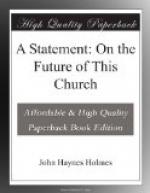I entered the church, therefore, primarily because it had a pulpit. But other reasons, not so decisive, and yet impressive, persuaded me to this same end. Thus I saw in the church not only a pulpit but an altar. Indeed, the pulpit distinguished itself in my mind from a platform or a teacher’s desk, by the fact that it was always associated with the presence, visible and invisible, of an altar for divine worship. It was easy for me to picture myself as saying all I wanted to say in [6] college halls, in theater meetings, in public forums, but I craved for my work on behalf of truth the atmosphere and environment of spiritual devotion. It was my desire, in other words, to be not merely a teacher or speaker, but a preacher; not merely a prophet, but also a priest. This does not mean that I am a churchman, as such; or that I find any permanent significance in rituals or other forms of worship. But there is in me that which seeks the stimulus of praise and prayer, the uplift of conscious communion with the Eternal, the consolation of appeal to, and trust in, God. Not only from habit, but from temperament, I find myself at home amid religious rites. Nothing so moved me on my one trip to Europe, as the hours I spent under the shadows of the great cathedrals. As a quiet place of worship, as well as a high place of testimony, the church called me in those youthful years, and I gave answer.
A third motive for my choice of the ministry must not be forgotten. I refer to the appeal of the church as a place for action, a service station on behalf of public causes. My vision of what we mean by public causes was strangely limited. It scarcely went beyond the Unitarian denomination, and the works of charity and kindly reform with which it has always been identified. I was a passionate Unitarian in those days. I had read, and been deeply stirred by, the story of the achievements which Unitarianism had wrought on behalf of freedom, fellowship and character in religion. I reverenced its saints and prophets, and longed to follow in their train. Hence the eagerness with which I sought preparation for the Unitarian ministry—that I might serve the church—advance its glory and magnify its work.
It was with such ideas as these in my heart that I was ordained in February, 1904. Within two years there came an event which shook my life to its foundations, revolutionized my thought, and changed the whole character of my interest and work. I refer to what we have [7] learned to describe in our time as the social question. This question, of course, is nothing new. It has burned at the heart of life from the beginning, and at intervals has flamed forth like the eruption of a volcano, to the terror and glory of the world. Its latest phase, as we know it today in the religious field, made its appearance at about the time I entered the ministry. I recall that the book, which first revealed the fires so soon to burst upon us—Prof. Peabody’s




